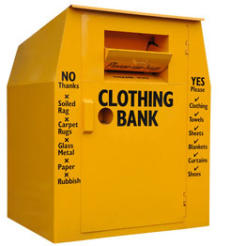The Fundraising Standards Board has asked the Salvation Army to deal with a public complaint about the charity's arrangement with its commercial clothing bank partner following national press coverage criticising the partnership for favouring the company.
An article in the Guardian on Sunday highlighted that Kettering Textiles, the company which runs Salvation Army’s many thousand clothing collection banks around the country, has made £10m from the practice over a three-year period while the charity has pocketed £16.3m.
The FRSB received a complaint from the journalist behind the story which it has now referred back to the Salvation Army to handle. The Charity Commission has yet to decide whether it has a role in looking at the relationship between Kettering and the charity. The FRSB and Commission have been in contact with each other on the subject.
‘Trustees must get best possible return from partners’
Alistair McLean, chief executive of the FRSB, told Civil Society that the issue of concern to his organisation is around the “accountability and transparency of disclosures” on the clothing banks.
“It can be appropriate for charities to enter into commercial arrangements with companies which can offer expertise charities might not have. Those commercial arrangements are a matter for the charity,” he said.
However, he added: “Trustees have a responsibility to get the best possible return from those commercial arrangements.”
He dismissed the suggestion that clothing collections have become a toxic issue, but said that with the price of second-hand textiles and clothes on the rise, charities might do well to review their commercial partnerships.
“Clearly there is so much more money to be made by clothing collections. There is maybe a question for charities to consider their commercial relations with their partners. It’s just good practice.”
Salvation Army defends partnership
Lieut Colonel David Hinton, chair of the Salvation Army Trading Company board of directors, said that the charity is now rolling out a statement to publish on all Kettering clothing banks around the country and will work closely with the FRSB in dealing with the complaint.
“The Salvation Army has been open and transparent about all the facts relating to its relationship between itself and SATCoL and Kettering Textiles,” he said, adding that all the information in the Guardian article has been readily available on the SATCoL website.
Lieut Colonel Hinton said that the charity is aware that the article might cause concern to Salvation Army donors, but defended the partnership.
“We are confident that the relationship between SATCoL and Kettering Textiles, which has been carefully worked out and has proved beneficial to the work and the mission of the Salvation Army over many years, greatly benefits the Salvation Army.
“We are confident that the Salvation Army benefits as much, if not more, from this relationship than we would if we worked with another company with whom we do not share that historical relationship."
Hinton said the relationship sees all donated clothes first offered for sale in Salvation Army charity shops with the remaining donations then sold by Kettering for re-use and recycling. He said this equates to around two-thirds of donated goods being kept by SATCoL and the final third going to Kettering, meaning the Army gets approximately £240 per tonne of clothes.
Alistair McLean said that the FRSB would follow normal complaints procedures in conjunction with the Salvation Army in dealing with the journalist’s complaint.
Don’t ‘mislead public’, says Traid
Meanwhile, textile recycling and aid charity Traid has called for more clarity over when and how much money goes to commercial partners via collection bins, in accordance with requirements in the 2006 Charities Act.
Maria Chenoweth-Casey, chief executive of Traid, said: “Where profits, often extremely substantial, go to a commercial agent, this must be stated on the textile bank. Otherwise, it is misleading to the public who fully expect the charity which is advertised on the bank to fully benefit from their donations. In these instances, the commercial textile merchant is essentially being hidden by the charity brand.”
A statement from the charity continued: "As a charity, Traid depends on public trust to carry out its work. There is absolutely nothing wrong with commercial organisations working with charities to raise vital funds. However, where commercial profiteering is hidden by the charity brand, it is detrimental to public trust, and tars all charities with the same brush."









